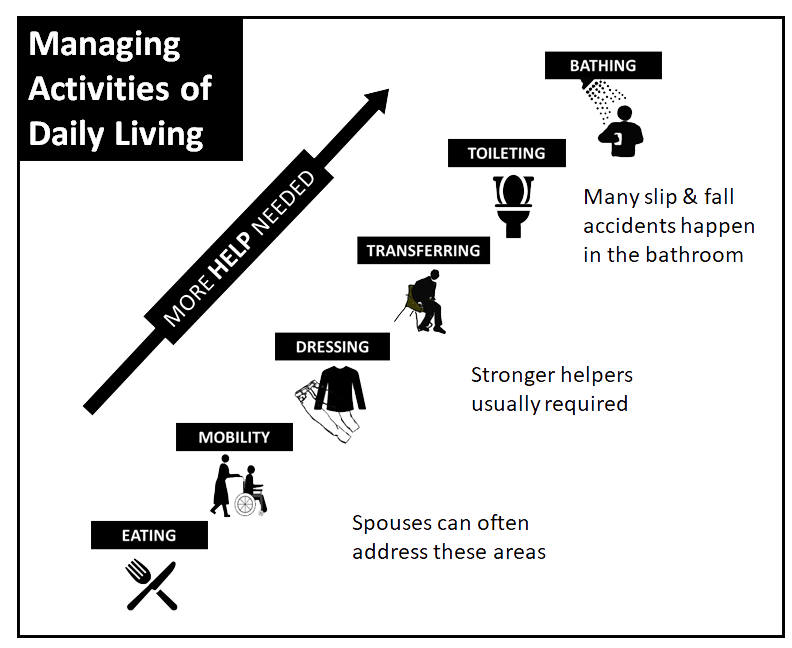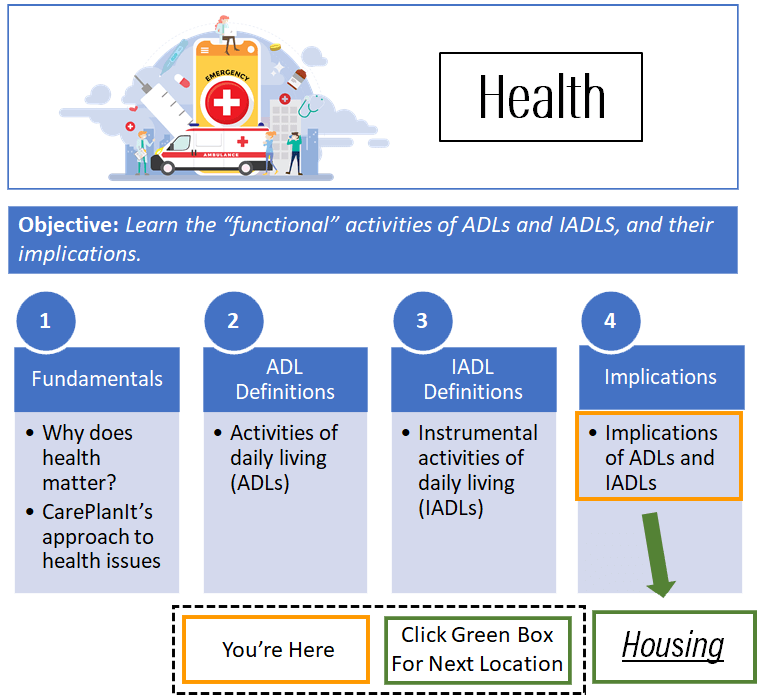Using ADLs & IADLs For Senior Health Assessment
Click here to see what's on this page.
Activities of daily living (ADLs) and instrumental activities of daily living (IADLs) are the most common health industry diagnostic tools for assessing a senior’s ability to perform the tasks of daily life. The information here in CarePlanIt’s Health Section is designed to familiarize seniors and their families with these senior health assessments and their criteria.
Our ability to perform ADLs and IADLs determines our ability to care for ourselves. Think of them as eldercare assessment tools. Areas, where we are unable to care for ourselves, require others to perform tasks. The ADLs and IADLs we can’t do indicate the activities that others must do for us or help us perform. There is a good video here explaining how professionals conduct assessments.
How Families Help Supplement A Senior’s Capabilities
We can use ADLs and IADLs to evaluate ourselves as seniors. We can also use these health assessment tools to evaluate elderly loved ones like a parent or spouse. If we pay attention to ourselves as seniors or our parents if we’re interested in helping them, we can often supplement their abilities, so they can remain in their home.
For example, helping a senior grocery shop, clean their home, do laundry, and pay bills may extend the time a senior stays in their home. The help can come from many people. It might be a spouse, a child, or a hired caregiver. It may only take family members a few hours a week to help. The alternative might require the senior to move to assisted living or a family member’s home.
Senior Health Assessments Can Prevent Catastrophic Injuries
Periodically using ADLs and IADLs for eldercare evaluation allow families to provide needed support before something bad happens. Most senior injuries happen while performing ADLs and IADLs. Knowing when we, or our loved ones, are losing abilities allows others to step in and prevent serious injuries.
Family Members Or Caregivers Can Step In Early To Prevent Bad Outcomes
Often times seniors wait too long before acknowledging they need help. Family members ignore signs like seniors falling, losing balance, or forgetting important things. Using elder care assessments can help seniors acknowledge they need help and alert families to their needs. The help can prevent injuries and keep seniors in their own homes.

Make sure you review Activities of Daily Living (ADLs) here, and Instrumental Activities of Daily Living here. These Sections will educate you on the criteria used by professionals to evaluate the abilities of seniors.
Ways To Use Senior Health Assessments To Address Declining Capabilities
Once you understand health in terms of ADLs and IADLs, you can start to contemplate what you want to do when addressing a health issue.
Wealthy Super Agers Carmen and I interviewed had a list of caregivers that they would call when they needed the help. They knew that after a hospitalization, they could come home and have a caregiver. They weren’t putting extra stress on an ailing spouse or disrupting a child’s life.
Average income Super Agers had a different strategy. Some had moved close to a child or grandchild who had already agreed to help them when they needed the help. Others were active in their Church senor outreach program and knew that they would be cared for by the Church in their time of need. Others moved to assisted living facilities that could coordinate needed care.
Non-Super Agers tended to wing it. When they needed help, it became a family crisis.
If you want to use CarePlanIt’s assessment tool, you can purchase it here. A sample is here.
